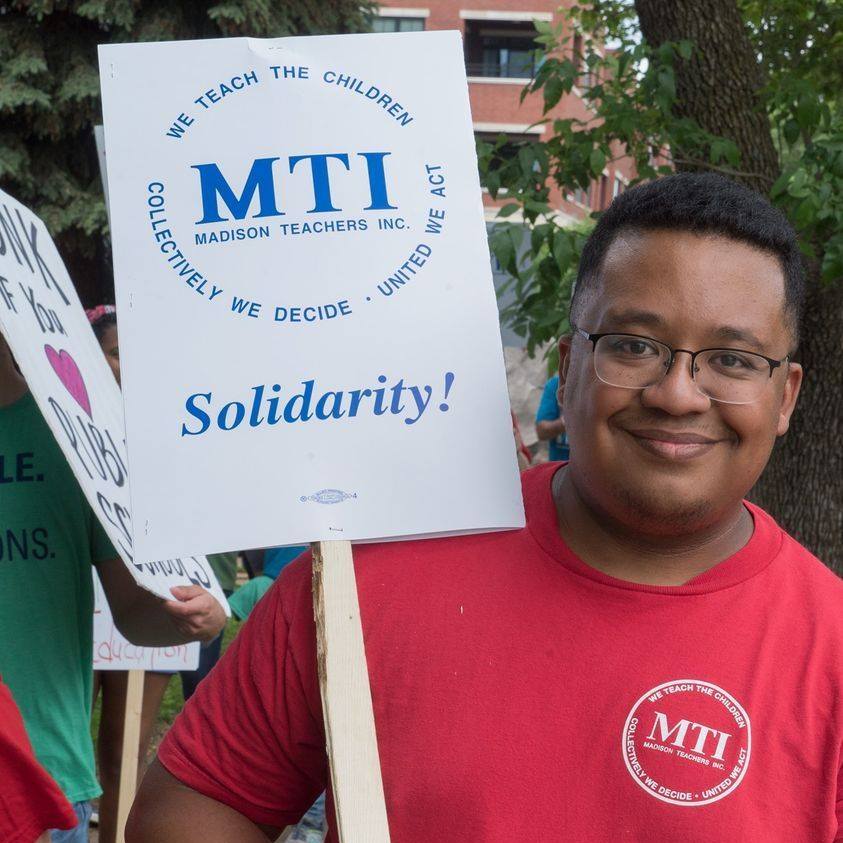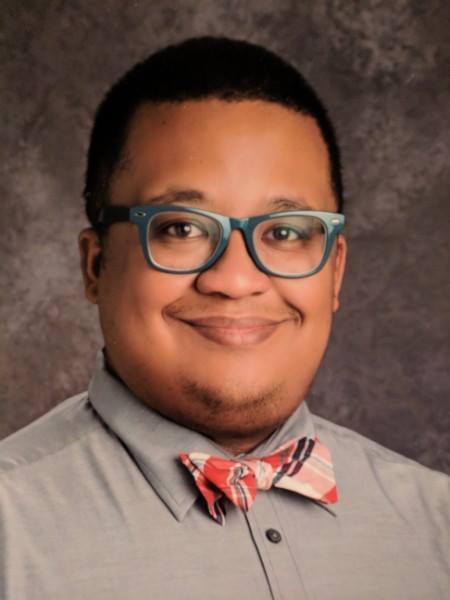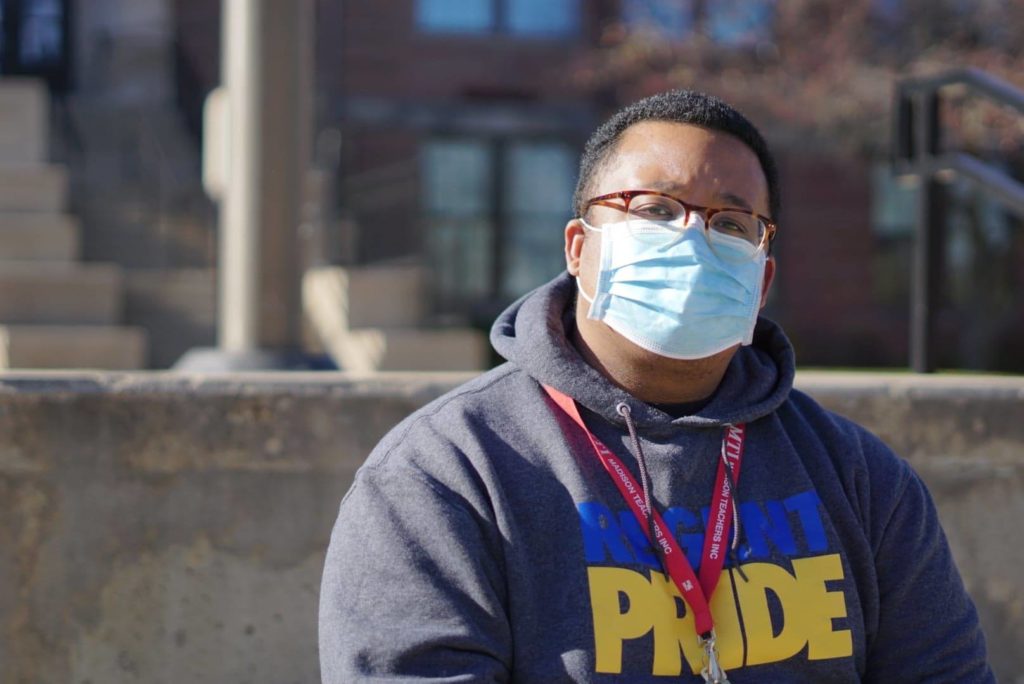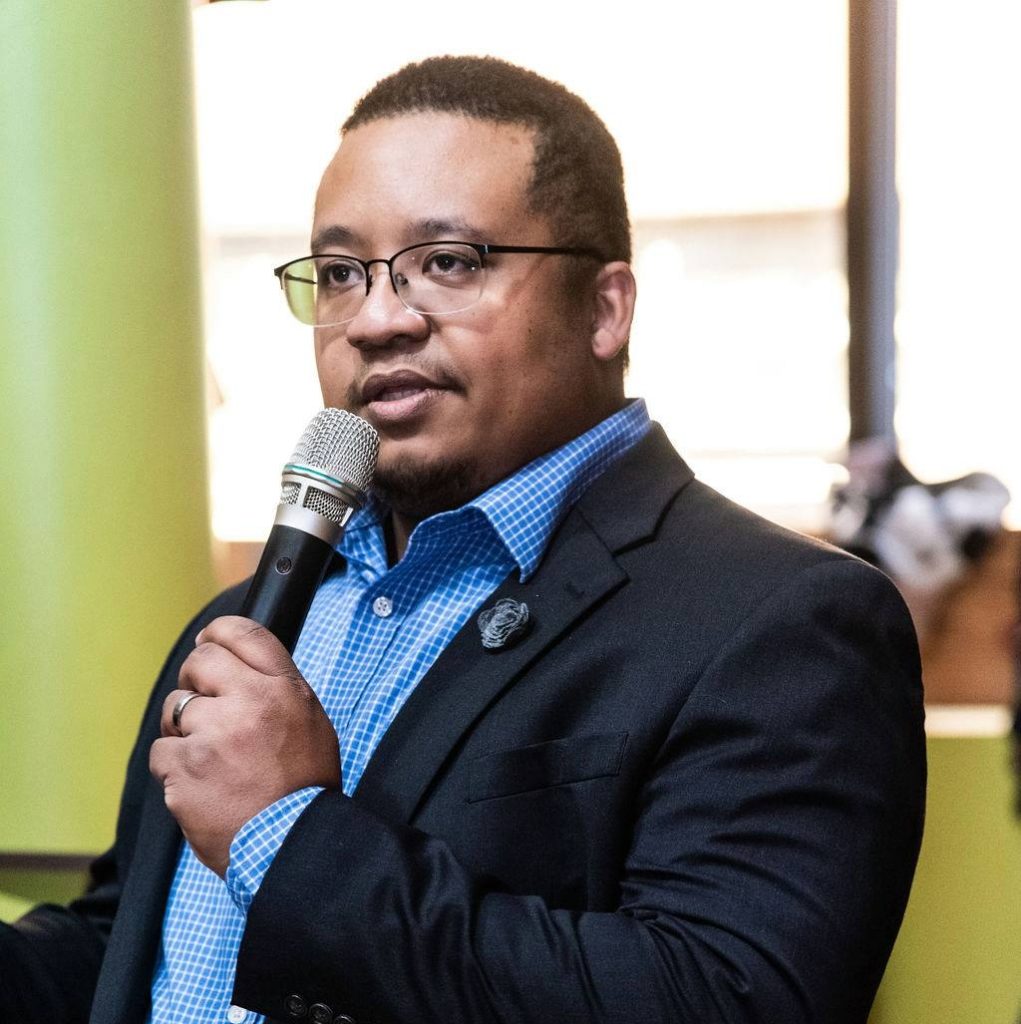
The recruiting, retaining and nurturing of teachers and staff of color in the Madison Metropolitan School District (MMSD) will be a priority for incoming Madison Teachers Inc. President Michael Jones. Representation matters, and that also means emphasizing and uplifting the often-marginalized voices in schools and the community to help determine priorities and brainstorm solutions.
“We need to talk about retaining staff of color, not just recruiting staff of color,” Jones tells Madison365. “Because a lot of times we’ll hire teachers or young staff of color and they will want to get out of this system a year or two or three in. It’s those first three years that are vital. Going into a very white-centered system, it can feel very difficult to navigate through that … especially if you feel as if you don’t have the support of your peers or your administration.
“That’s the number one reason staff of color everywhere in this country leave – because they don’t feel supported and they don’t feel like it’s an environment set up for them,” he adds. “So I think, at least on the union side, that we need to own that and figure out how we can repair past harms. But we also need to figure out how we can push for an environment that can be more conducive to our staff of color to actually want to remain here.”

It’s important to have people of color at the table making key decisions for a school district that has been majority non-white for quite some time now. The MMSD school board is currently made up of predominantly people of color for the first time ever. That is positive, he says.
“I’m thankful for that,” Jones says. “But I think it’s important that we look at every decision and ask: Is this actually going to drive us to where we need to go? If we’re an anti-racist organization or community, is this the best move? Sometimes it’s not the most popular thing, but it’s something that will help the most.”
Madison Teachers Inc. (MTI) is a member-driven union consisting of teachers, educational professionals and paraprofessionals, educational assistants, substitute teachers, supportive educational employees, school security assistants who are employed by the Madison Metropolitan School District.
Jones will be the second-ever African-American MTI president, the first being Dr. Carolyn Stanford-Taylor back in the late ’80s. Stanford-Taylor would go on to become Wisconsin State Superintendent of Public Instruction in January of 2019, the first African-American state superintendent in Wisconsin history.
“I tell [MMSD Superintendent] Dr. [Carlton] Jenkins, as I tell other people, that I’m the first Blasian to hold this position and I believe, to the best of my knowledge, the first person of Asian heritage to be president,” says Jones, who is half-Vietnamese. “I take great pride, as much as being Black, as being Vietnamese and being able to represent that community as well within MTI and within education.”
Equity and social justice have always been very important for Jones, and he says that a big priority of his as president is to improve the equity work within the union.
“We’ve made great strides the past few years as far as coming to terms and recognizing some of the things that what we needed to do to change both internally and in pushing the district on things to hold them accountable with their equity work,” Jones says. “Honestly, if we’re talking about representation … if we’re talking about how we make decisions, we need more leaders of color within our union and I have every intention of trying to uplift that perspective and that voice within our union and within our teacher ranks.
“Our teacher ranks are diversifying and if we are going to survive as a union, we need to diversify with it as well, and really take a hard look at our stances and how they best help our students of color, our staff of color and our communities of color,” he adds.
Born in Milwaukee, Jones’s family moved to Eagan, a suburb of Minneapolis, when he was a toddler where he spent his childhood.
“Wisconsin was always in my blood. My dad was a big Packer fan,” Jones remembers. “Our family road-tripped to the northside of Milwaukee. So when it came to looking at colleges, I wanted to go somewhere in Wisconsin.”
Jones earned a bachelor’s degree in political science from UW-Madison and a master’s degree in education leadership from Edgewood College.
He was a positive behavioral interventions and supports coach and special education teacher at BlackHawk Middle School in Madison and a special education teacher in the Middleton-Cross Plains School District, prior to becoming the Dean Of Students at Madison West High School.

Jones has been one of the developers of Madison’s “Black Lives Matter Week of Action in Schools.”
“We were doing some really interesting things at West, especially regarding our anti-racism work,” he says. “At Madison West, our demographics are very different compared to East, La Follette and Memorial and in terms of past privileges and neighborhoods we pull [students] out of. So it was interesting to really get into some anti-racism work with the West community and unpacking some of our past privileges and our current struggles.”
He had been vice president of MTI since 2014 before being elected president in early February of this year. Jones says that he’s “grateful that the members trusted me to be president.”
A week after he got elected, Superintendent Jenkins announced that MMSD would be coming back in session for in-school classes in March.
“It’s been a bit of a crash course and a learning experience. I think that one of the biggest things that we have to reckon with is that our mental health capacity and mental health structures to support students and staff and families in this community was severely lacking even long before COVID,” Jones says. “COVID just exacerbated or exposed what was already lacking.
“I’m at what some people would argue is the most-privileged high school in MMSD and we went from three social workers to two social workers last year – and that decision was made pre-COVID. The ACLU says we should be having one social worker for every 250 kids,” Jones continues. “At West, we have one social worker for every 1,100. That disparity is true at any of the high schools in MMSD and most of the middle schools. It’s true at a lot of our elementary schools.”
Jones notes that with the removal of SROs, that money will go towards restorative justice coordinators who address mental health and the overall vibe of the school community.
“I think that’s a positive direction, but I think one thing we can do as a union is really push back and say, ‘Do we have enough psychologists? Do we have enough nurses? Do we have enough counselors and social workers?’” he says.
What’s the sentiment and vibe of the teachers who are coming back to in-person classes?
“Overall there’s a feeling of skepticism. Whether that skepticism is driven by anger or fear or other ranges of emotions … that’s one of those things where you’re asking a teacher to come back into this environment that public health, the nurses, medical experts, board and leadership are saying, ‘Hey, we’re doing everything possible to make sure that this is a safe place for the kids to be,'” Jones says. “But at the same time, I’m hearing reports that teachers are telling me, ‘Yeah, they just added more desks so we can’t socially distance.’ This teacher is telling me that, ‘We still don’t have a plan for PPE [Personal protective equipment].’ This teacher is telling me, ‘My building still doesn’t have an adequate HVAC system.’
“Some buildings are set up. But other buildings are not. If one building in this district is not set up for success and centered around the health and welfare of the kids and the staff that have to occupy that space, then that’s one building too many,” he adds. “We have to be honest and be able to put it up and shine a light on it and problem-solve around it instead of pretending like it doesn’t exist or nothing bad will happen.”
Emotional and mental health will be key concerns as students, teachers, and staff come back.
“Our whole community should appreciate from this past year’s experience is the need to look at mental health and before we rush back into the building and talk about this myth of learning loss and academic needs, we really address the trauma we’ve all been experiencing,” Jones says.
“But also understanding that trauma is exponential and compounded for people of color and communities of color especially in recognizing our privilege in certain spots,” he adds.
Jones, the founding co-chair of MTI’s Diversity and Equity Committee, wants to push the teacher’s union to be more of a social justice organization and forge “more partnerships with the community to be better allies of people who are already doing the work.”
“We talk about wanting to be anti-racist educators and being in an anti-racist school district and being in an anti-racist community, but part of that is being like not just what we think is good, but actually helping other people do what they think is good,” he says.

Black and Latino teachers are significantly underrepresented in public schools throughout the nation, including MMSD. One thing that Jones says that they have really been working on is looking at how they train, recruit, and nurture future educators.
“We have high school students who want to be educators but the financial barriers of college can be overwhelming. Also, the social barriers of being a person of color in predominantly white space like UW or Edgewood [College] … that’s a minefield,” Jones says. “We need people who have been through that minefield to guide other people through and clear the mines.
“We have plenty of opportunities there. I’d like to think that because of my upcoming position and privilege that I would be able to at least help drive that message forward,” he adds.
Jones is getting ready for his official starting date as president and will be sworn into office at the May Faculty Representative Council meeting.
“I want to be there to facilitate members’ voices for the re-entry [into schools]. This discussion is going to be a year-long discussion of re-entry. There is this piece right now going on, but then we have to talk about how is this going to look at every grade level and how is this going to look in September,” Jones says. “Our members, educators and staff who have been in the building since September – like MSCR Cares, special education providers, teachers, SEAs, food service, custodians, security – all have interesting ideas on how we can make this work. But are we listening to everyone or are we focused just on titles?
“Can I use my title to make sure that everybody is being heard and continuing that sense of collaboration and unity and also making sure that, especially, our students of color and families of color have a voice?” Jones continues. “Do we have everybody that we need here or are we missing perspectives? Because I’d argue that we are missing perspectives. So what are we doing to fight to get those perspectives here?
“There are certain things I can push on in terms of structures and how we help our members help each other and help their colleagues because we’re all going to need to lean on each other in new and different ways,” he adds.



